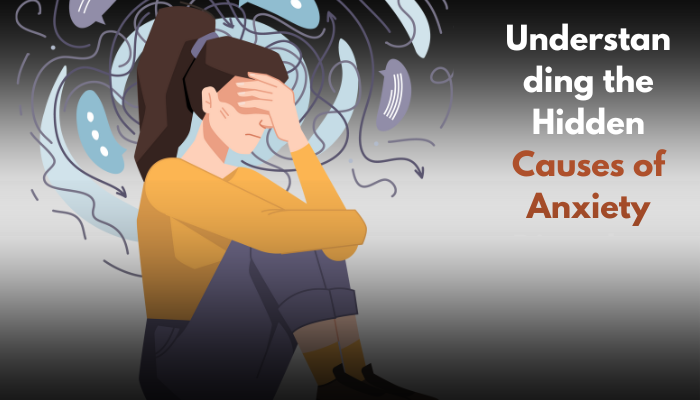Understanding the Hidden Causes of Anxiety Disorders
Anxiety isn’t always loud or obvious. Sometimes, it sneaks in through overthinking, trouble sleeping, or a persistent feeling that something...

Anxiety isn’t always loud or obvious. Sometimes, it sneaks in through overthinking, trouble sleeping, or a persistent feeling that something isn’t quite right. While it’s normal to feel anxious occasionally, chronic or overwhelming anxiety might point to deeper, often hidden causes. Understanding what drives anxiety disorders can offer a path toward healing, clarity, and control.
This article explores the causes of anxiety that aren’t always immediately visible those rooted in our biology, past experiences, and daily habits. By shedding light on these lesser-known triggers, we aim to help you understand your symptoms better and guide you toward more effective solutions.
1. Genetic Predisposition, Anxiety May Run in the Family
A family history of anxiety doesn’t guarantee you’ll develop it but it can significantly increase your risk. Research indicates that anxiety disorders often cluster in families, suggesting a genetic component.
Why genes matter:
- Certain inherited traits influence how the brain responds to stress.
- Studies show higher concordance rates in identical twins.
- Genetic predisposition may affect neurotransmitter regulation, especially serotonin and dopamine.
This means that for some people, the causes of anxiety may partially lie in their DNA. However, genes aren’t destiny they only contribute to susceptibility, not certainty.
2. Brain Chemistry and Neurobiological Factors
The brain’s chemical messengers neurotransmitters play a central role in mood regulation. Imbalances in certain chemicals can trigger or intensify anxiety symptoms.
Key brain-related causes of anxiety include:
- Low serotonin levels, linked to mood instability and obsessive thinking
- Overactivity in the amygdala, the brain’s fear-processing center
- Disrupted GABA functioning, which normally calms nervous system activity
Neuroimaging studies have shown that individuals with anxiety disorders often display altered brain function in areas responsible for emotion regulation and threat detection.
3. Early Childhood Trauma and Attachment Issues
Our earliest relationships and experiences can profoundly shape how we deal with stress later in life. Unresolved trauma, neglect, or inconsistent caregiving during childhood can plant the seeds of chronic anxiety.
These traumatic origins often lead to:
- Heightened sensitivity to perceived danger
- Difficulty trusting others or feeling safe
- A persistent “fight or flight” mode in adulthood
Understanding these emotional foundations is critical when exploring the causes of anxiety that are deeply rooted in our developmental years.
4. Chronic Stress and Lifestyle Pressures
Even without a traumatic event or genetic predisposition, long-term exposure to stress can lead to anxiety disorders. Overworking, financial instability, lack of rest, and poor boundaries can overload the nervous system.
Lifestyle-driven causes of anxiety may include:
- Skipping meals or poor diet
- Lack of quality sleep
- Excessive caffeine or alcohol use
- No work-life balance or downtime
- Perfectionism and constant self-criticism
Over time, these pressures build up, leading to persistent tension and unease. Addressing lifestyle habits is often a practical starting point for managing anxiety symptoms.
5. Medical Conditions That Can Mimic or Trigger Anxiety
Anxiety isn’t always psychological. Sometimes, it’s a symptom of an underlying health condition. It’s important not to overlook physical health as a factor when investigating the causes of anxiety.
Common medical contributors include:
- Thyroid imbalances (especially hyperthyroidism)
- Hormonal fluctuations (e.g., PMS, menopause)
- Hypoglycemia (low blood sugar)
- Heart arrhythmias or respiratory issues
- Vitamin deficiencies (e.g., B12, magnesium)
Always consult a healthcare provider to rule out these potential contributors, especially if anxiety symptoms appear suddenly or are accompanied by other physical changes.
6. Substance Use and Withdrawal Effects
Certain substances can heighten or worsen anxiety, either during use or withdrawal. Even legal substances like caffeine or alcohol can influence how anxious a person feels.
Substances linked to anxiety responses:
- Caffeine: Excess consumption can mimic panic symptoms.
- Alcohol: Initially calming, but increases anxiety as it wears off.
- Nicotine: May relieve stress in the short term but worsens anxiety long-term.
- Illicit drugs: Can cause severe anxiety during withdrawal periods.
For many, one of the hidden causes of anxiety is the unnoticed impact of regular substance use on mood and brain chemistry.
7. Personality Traits and Cognitive Patterns
Some people are naturally more prone to anxiety due to temperament or learned thinking styles. High sensitivity, perfectionism, or a tendency toward overanalysis can amplify stress responses.
Personality-linked causes of anxiety include:
- Overthinking and rumination
- Black-and-white thinking or catastrophizing
- Excessive need for control or predictability
- Low frustration tolerance
These cognitive habits may have been reinforced over time, making them harder to recognize as anxiety contributors. Cognitive-behavioral therapy (CBT) often targets these very patterns.
8. Environmental and Social Triggers
External surroundings play a significant role in emotional well-being. From noisy neighborhoods to toxic workplaces, constant environmental stress can contribute to anxiety disorders.
External causes of anxiety can stem from:
- Exposure to violence or unsafe conditions
- Social isolation or lack of community
- Pressure to conform in rigid environments
- Poor air quality or inadequate access to nature
Sometimes, changing our environment or how we relate to it can significantly reduce anxiety.
9. Hormonal Changes Across the Lifespan
Hormones influence not just physical health, but also mood and anxiety levels. Fluctuations during major life stages can be significant but are often overlooked.
Hormonal causes of anxiety may occur during:
- Puberty
- Pregnancy or postpartum
- Menopause
- Chronic hormonal disorders (e.g., PCOS)
If anxiety symptoms intensify around hormonal shifts, it’s worth discussing this with a healthcare provider who can evaluate underlying imbalances.
10. Cultural and Societal Pressures
Not all causes of anxiety are personal or medical. Many people experience anxiety as a result of societal expectations or cultural identity conflicts. Living with discrimination, gender-based expectations, or immigration-related stress can have a profound psychological impact.
For individuals from marginalized communities, anxiety may stem from:
- Feeling unsafe or excluded
- Identity suppression or stigma
- Constant pressure to meet unrealistic standards
- Fear of failure or judgment
Addressing anxiety in these contexts requires culturally sensitive approaches and safe spaces for expression.
Key Takeaway
Anxiety disorders are complex, often emerging from a mix of biological, psychological, and social factors. Identifying the root causes of anxiety is a crucial step toward effective treatment. Therapy, lifestyle adjustments, and medical support all play important roles in recovery.
If you’re dealing with persistent anxiety, don’t hesitate to seek support. Working with a qualified therapist or healthcare provider can make a meaningful difference. And if you’re searching for anxiety treatment in Philadelphia, consider connecting with trusted local professionals who offer compassionate, personalized care. Like choosing the right outsourcing partner for a project, finding the right therapist can change the outcome completely so take the time to explore your options.
If you’re also exploring trauma-related care, you might find our guide on How to Choose Affordable Trauma Therapy in Philadelphia That Works for You helpful.



